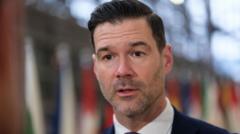Is the Swedish Minister's Teen Son Involved with Extremist Groups?

Understanding the Implications of Sweden's Migration Minister Johan Forssell's Controversy
The recent revelations regarding Johan Forssell, Sweden's Migration Minister, have sparked significant debate about parental responsibility, youth involvement in extremist activities, and the broader implications for Sweden's political landscape. Forssell's admission that his teenage son has links to white supremacist groups raises questions not only about his role as a minister but also about the effectiveness of Sweden's policies on extremism and migration. This article delves into the details of the situation, its background, and the potential ramifications for the Swedish government and society at large.
A Shocking Revelation
On Thursday, Johan Forssell confirmed that his son was the unnamed "close relative" identified by the anti-racism watchdog Expo as being active in far-right circles. Forssell stated he was unaware of his son’s activities until contacted by Sweden's security service, Sapo. This revelation has led to a complex series of events that have not only put Forssell's political career in jeopardy but also highlighted the challenges many parents face in monitoring their children's online behavior.
Forssell's Response
Forssell has expressed that he did not publicly address the allegations earlier to protect his son’s privacy. "This has not been about protecting me as a politician, but about protecting a minor," he asserted. His comments resonate with many parents who struggle to stay informed about their children's online interactions. Forssell further explained that he and his wife had engaged in extensive discussions with their son, who reportedly feels remorse for his actions.
Political Implications
The controversy has drawn mixed reactions from political leaders. Prime Minister Ulf Kristersson expressed confidence in Forssell's handling of the situation, suggesting that he has acted responsibly as a parent. However, the situation has also ignited accusations of double standards from opposition parties. Critics argue that Forssell's government has not done enough to combat extremism, particularly in light of their collaboration with the far-right Sweden Democrats, a party with controversial roots.
The Rise of Extremism in Sweden
Sweden has witnessed a troubling rise in extremist activities over the past decade. Various reports indicate that right-wing extremist groups have gained traction, leading to increased public concern and governmental action. The emergence of the Nordic Resistance Movement (NMR), a banned neo-Nazi organization, exemplifies the challenges that authorities face in curbing extremist ideologies.
Government Response to Extremism
The Swedish government has attempted to address the rise of extremism through multiple initiatives, including:
- Legislation: Stricter laws have been introduced to combat hate speech and extremist group activities.
- Community Programs: Initiatives aimed at integrating young people into society and away from extremist ideologies have been launched.
- Parental Guidance: Increased emphasis on parental responsibility regarding children's activities, especially in digital spaces.
These efforts, however, have faced criticism for being reactive rather than proactive, particularly when it comes to addressing the root causes of extremism.
Parental Responsibility and Awareness
Forssell's situation raises essential questions about parental awareness in the digital age. With social media platforms often acting as breeding grounds for extremist ideologies, parents must navigate a complex landscape of online interactions. Forssell's admission that he was unaware of his son’s activities until recently highlights a common struggle for many parents today.
The Role of Social Media in Radicalization
Social media plays an instrumental role in the radicalization of youth. The internet provides a platform for extremist groups to recruit and spread their ideologies, often targeting vulnerable individuals who may feel isolated or disenfranchised.
Indicators of Radicalization
Parents can look for several signs that may indicate a child is becoming radicalized:
- Changes in social circles or friendships.
- Increased secrecy regarding online activities.
- Exposure to extremist content or ideologies.
- Withdrawal from previously enjoyed activities.
Understanding these indicators can empower parents to engage with their children more effectively and potentially redirect them away from harmful influences.
Public Reaction and Future Implications
The public's response to Forssell's situation has been mixed. Some support his stance as a responsible parent, while others see it as indicative of deeper issues within the government regarding extremism. The opposition Left Party has already indicated plans to summon Forssell before a parliamentary committee, further intensifying scrutiny on his position and the government's policies.
Broader Societal Impact
As this story unfolds, the implications extend beyond the individual case of Forssell and his son. It raises fundamental questions about how society can combat extremism more effectively while fostering an environment that encourages open dialogue between parents and children. The balancing act between protecting minors and addressing political accountability remains a pressing concern.
Conclusion
Johan Forssell's situation serves as a critical reminder of the challenges posed by extremist ideologies in today’s society. As parents, communities, and governments grapple with these issues, it is vital to foster an environment of awareness, communication, and proactive measures against radicalization. The conversations sparked by this incident may lead to more robust policies and practices aimed at preventing youth involvement in extremist activities.
As we move forward, one must consider: How can we better equip parents and communities to combat the rise of extremism while ensuring the protection of our youth? The need for collaborative efforts has never been more apparent.
Frequently Asked Questions
What are the signs of radicalization in young people?
Signs of radicalization can include changes in social circles, secretive online behavior, exposure to extremist content, and withdrawal from previously enjoyed activities.
How can parents monitor their children's online activities?
Parents can engage in open conversations about online behavior, utilize monitoring software, and educate themselves on the platforms their children use.
What role does social media play in radicalization?
Social media provides a platform for extremist groups to recruit and spread ideologies, often targeting vulnerable individuals seeking community or belonging.
In times of uncertainty and rising extremism, society must ask itself: What can we do to create a safer, more inclusive future for our youth? #Sweden #Extremism #ParentalResponsibility
Published: 2025-07-10 16:32:14 | Category: technology



